人教版(2019)必修第二册Unit 4 History and traditions Listening and Listening and Talking 课件 (共30张PPT)
文档属性
| 名称 | 人教版(2019)必修第二册Unit 4 History and traditions Listening and Listening and Talking 课件 (共30张PPT) |
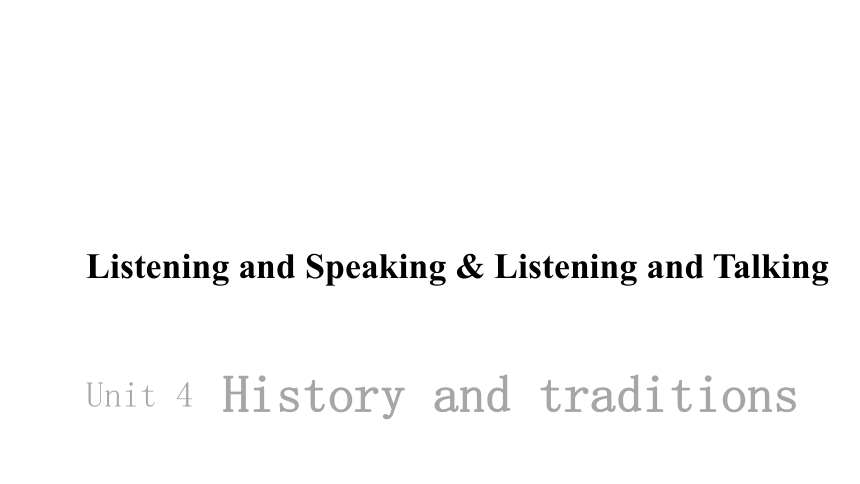
|
|
| 格式 | pptx | ||
| 文件大小 | 23.7MB | ||
| 资源类型 | 教案 | ||
| 版本资源 | 人教版(2019) | ||
| 科目 | 英语 | ||
| 更新时间 | 2024-04-05 16:18:22 | ||
图片预览

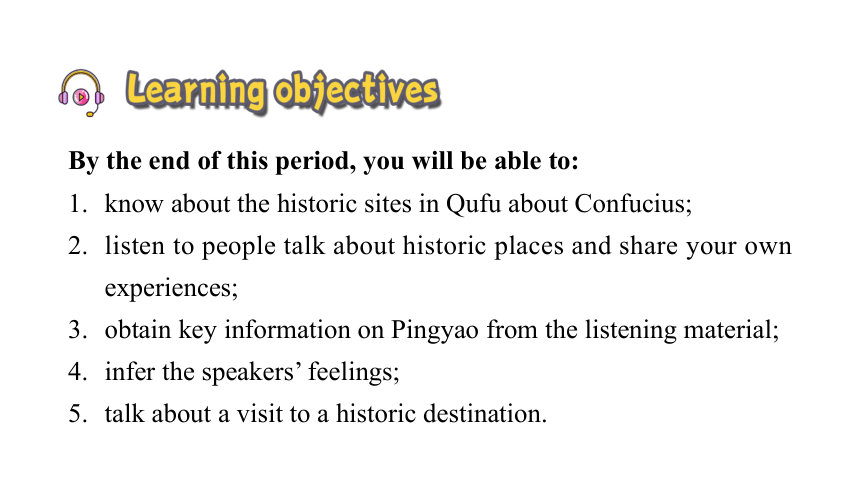

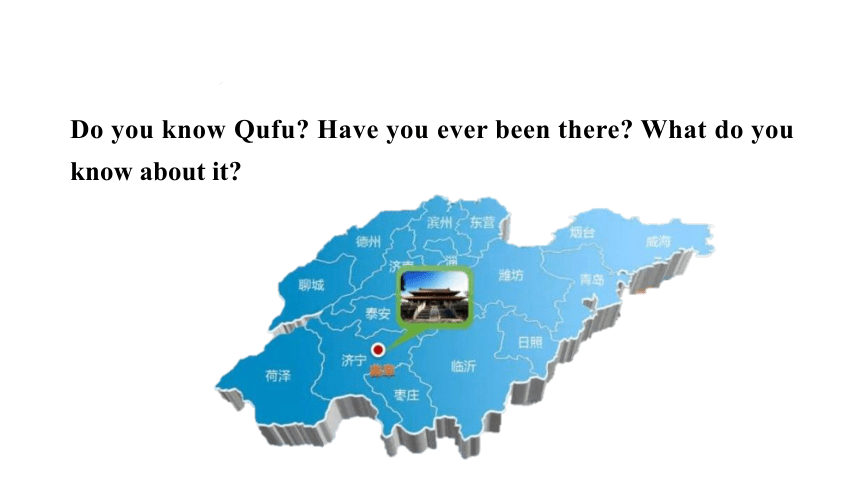
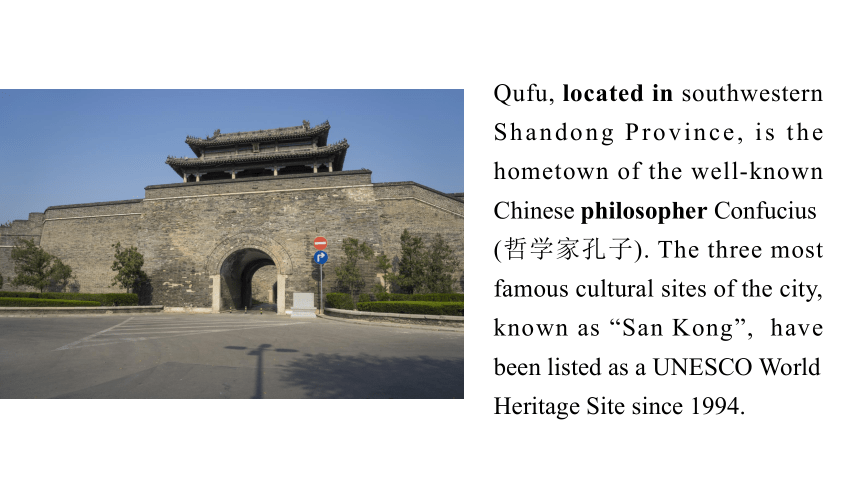

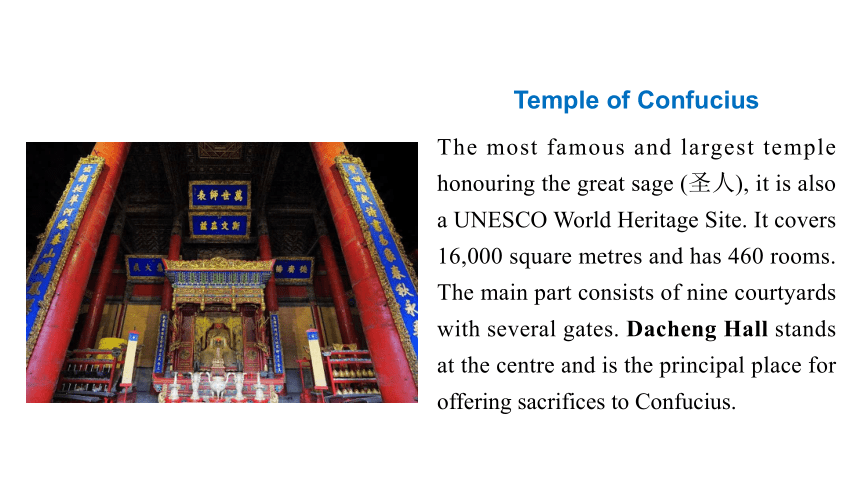
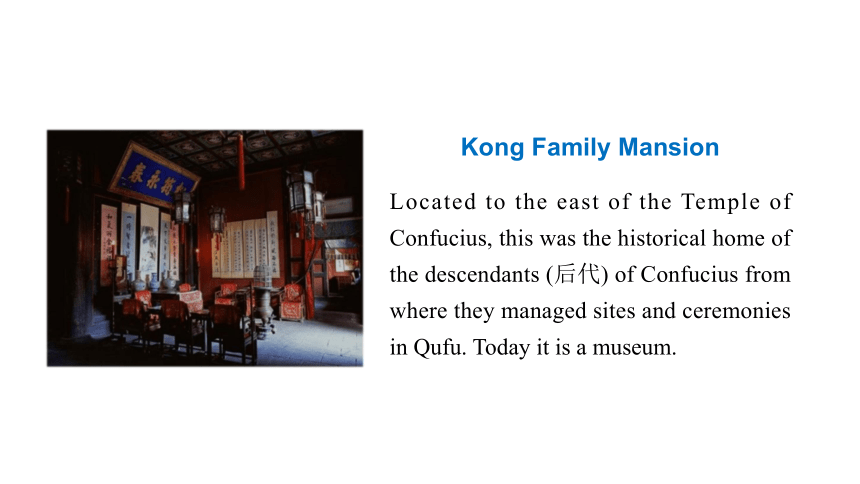
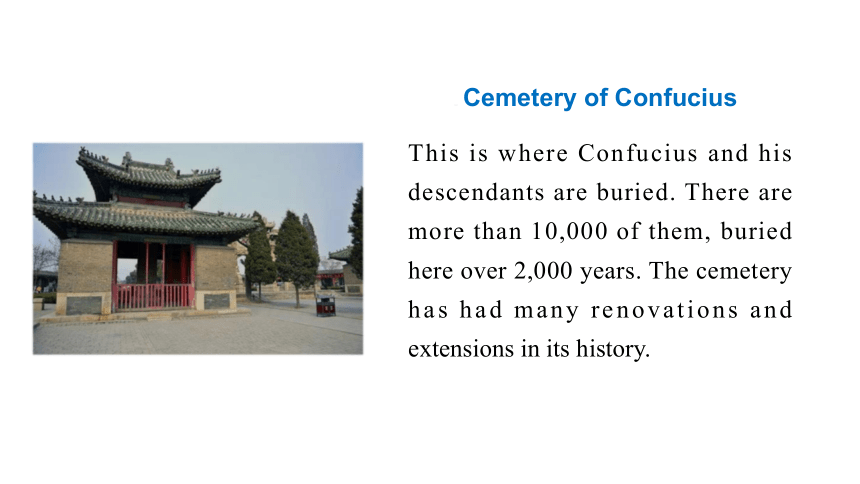
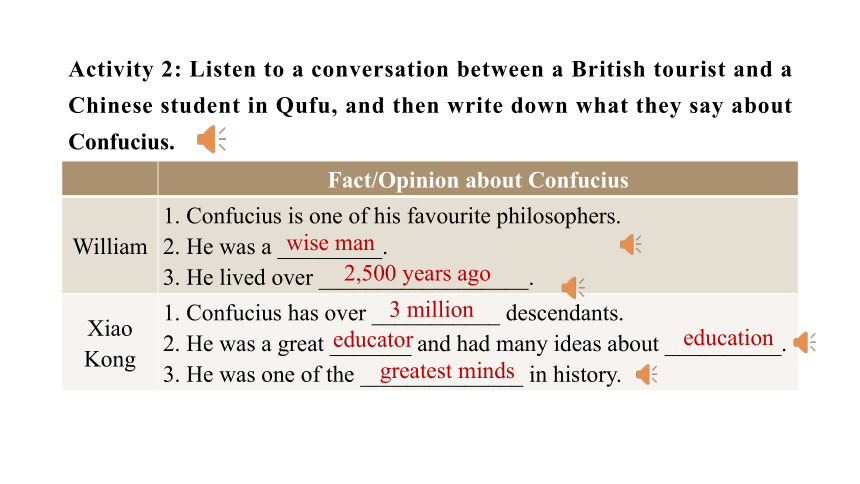
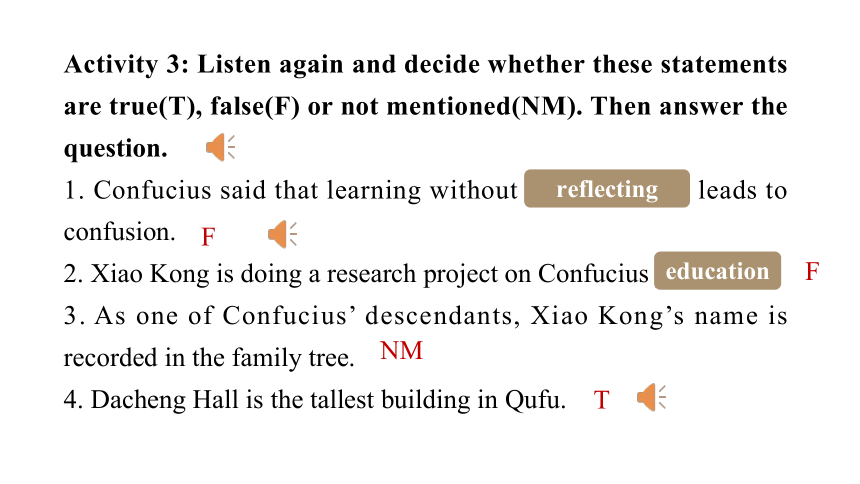
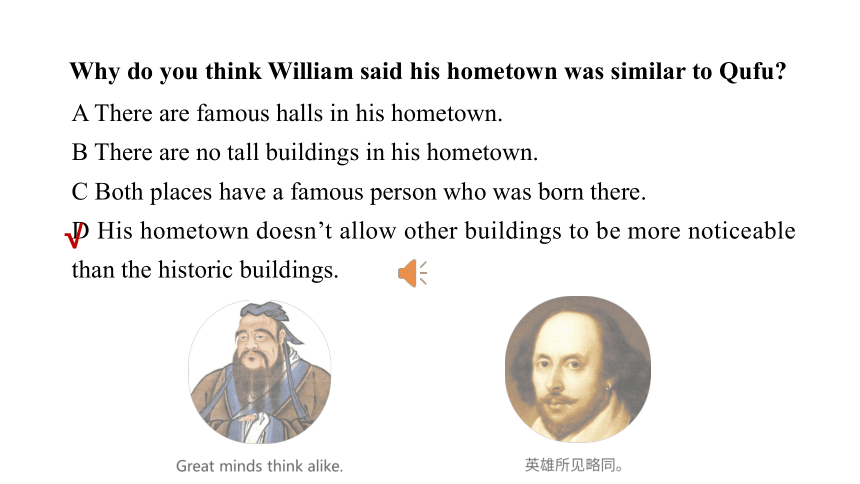
文档简介
(共30张PPT)
Listening and Speaking & Listening and Talking
History and traditions
Unit 4
By the end of this period, you will be able to:
know about the historic sites in Qufu about Confucius;
listen to people talk about historic places and share your own experiences;
obtain key information on Pingyao from the listening material;
infer the speakers’ feelings;
talk about a visit to a historic destination.
LISTENING AND SPEAKING
Do you know Qufu Have you ever been there What do you know about it
Qufu, located in southwestern Shandong Province, is the hometown of the well-known Chinese philosopher Confucius (哲学家孔子). The three most famous cultural sites of the city, known as “San Kong”, have been listed as a UNESCO World Heritage Site since 1994.
Activity 1: Before you listen, look at some photos of Qufu. What can you say about these places
Temple of Confucius
Kong Family Mansion
Cemetery of Confucius
The most famous and largest temple honouring the great sage (圣人), it is also a UNESCO World Heritage Site. It covers 16,000 square metres and has 460 rooms. The main part consists of nine courtyards with several gates. Dacheng Hall stands at the centre and is the principal place for offering sacrifices to Confucius.
Temple of Confucius
Located to the east of the Temple of Confucius, this was the historical home of the descendants (后代) of Confucius from where they managed sites and ceremonies in Qufu. Today it is a museum.
Kong Family Mansion
This is where Confucius and his descendants are buried. There are more than 10,000 of them, buried here over 2,000 years. The cemetery has had many renovations and extensions in its history.
Cemetery of Confucius
Activity 2: Listen to a conversation between a British tourist and a Chinese student in Qufu, and then write down what they say about Confucius.
Fact/Opinion about Confucius
William 1. Confucius is one of his favourite philosophers.
2. He was a _________.
3. He lived over __________________.
Xiao Kong 1. Confucius has over ___________ descendants.
2. He was a great _______ and had many ideas about __________.
3. He was one of the ______________ in history.
wise man
2,500 years ago
3 million
educator
education
greatest minds
Activity 3: Listen again and decide whether these statements are true(T), false(F) or not mentioned(NM). Then answer the question.
1. Confucius said that learning without understanding leads to confusion.
2. Xiao Kong is doing a research project on Confucius philosophy.
3. As one of Confucius’ descendants, Xiao Kong’s name is recorded in the family tree.
4. Dacheng Hall is the tallest building in Qufu.
F
F
NM
T
reflecting
education
A There are famous halls in his hometown.
B There are no tall buildings in his hometown.
C Both places have a famous person who was born there.
D His hometown doesn’t allow other buildings to be more noticeable than the historic buildings.
√
Why do you think William said his hometown was similar to Qufu
Xiao Kong : Oh, that’s the famous Dacheng Hall. You know, it’s so well-respected in Qufu that no other building in the city can be taller than it.
William: Wow, now that’s respect That’s a little bit like my hometown—Stratford-upon-Avon.
Xiao Kong: Wait, you mean where Shakespeare was from What a coincidence--Confucius and Shakespeare, two of the greatest minds in history! I really want to visit the UK—I’ m really interested in British history and culture.
Understanding idioms
An idiom is an expression which means something different from the meaning of the individual words. Some idioms present an idea or paint a picture that gives a hint as to the meaning. Other idioms can only be understood from the context in which they appear.
Activity 4: Write down the English idioms in the conversation. Explain their meanings and think about some Chinese equivalents.
English idiom Meaning Chinese equivalent
Achilles’ heel
pull one’s leg
fish out of water
something that is someone’s weakness
to joke with someone
Something who feels uncomfortable because they are in an unfamiliar place
弱点;要害
戏弄
如芒在背
Listening text
William: Excuse me, do you speak English I’m looking for the Confucius Temple, but I’m not good at maps—they’re my Achilles’heel!
Xiao Kong: Oh, hello, e with me—I’m going to the temple right now. By the way, what does“Achilles’heel”mean
William: Oh, it means that something is my weakness—I’m really bad with maps! So do you know much about Confucius He’s one of my favourite philosophers. He was such a wise man.
Xiao Kong: Oh, yes. I was born here. In fact, I believe I am a descendant of Confucius himself.
William: No way, you’re pulling my leg, right So how do you know you’re related to Confucius Didn’t he live over 2, 500 years ago
Xiao Kong: Yes, but his family tree is well recorded. He has over three million descendants. Sorry again, what does “pulling my leg” mean
William: Oh, sorry, it means to joke with someone. Anyway, so you’re actually going to the temple to pay respects to your relative
Xiao Kong: Well, yes. But I’m also meeting my study group there. We are doing a research project on Confucius’ ideas on education .You know Confucius was a great educator, and he had many great ideas about education. For example, he talked about the relationship between learning and reflecting. He believed that learning without reflecting leads to confusion... Oh, look, the temple is just over there.
William: Oh, great! What’s that big building over there
Xiao Kong : Oh, that’s the famous Dacheng Hall. You know, it’s so well-respected in Qufu that no other building in the city can be taller than it.
William: Wow, now that’s respect That’s a little bit like my hometown—Stratford-upon-Avon.
Xiao Kong: Wait, you mean where Shakespeare was from What a coincidence--Confucius and Shakespeare, two of the greatest minds in history! I really want to visit the UK—I’ m really interested in British history and culture.
William: Oh, that’s great! So later we can go for a cup of tea and have a chat about it. And it would be great if you could take me somewhere to get my watch fixed.
Xiao Kong: OK, no problem! So come and meet my study group—we can tell you all about the temple. And how long are you staying in Qufu I can show you the Cemetery of Confucius and the Kong Family Mansion as well...
William: Really That’s so kind! I need all the help I can get—I'm like a fish out of water.
Learning without reflecting leads to confusion.
学而不思则罔。
Review the old and learn the new.
温故而知新。
Make no social distinctions in teaching.
有教无类。
To learn and at due time to repeat what one has learnt, isn’t that after all a pleasure
学而时习之,不亦乐乎?
Confucius was a great thinker, educator, and philosopher.
His principles had a great influence on Chinese traditions and beliefs.
He believed strongly in strong family loyalty and respect for others.
He believed in the so-called “golden rule” of philosophy: Do not do to others what you do not want others to do to you.
LISTENING AND TALKING
Some places of interest and historic sites in Pingyao:
the City Wall
Shuanglin Temple
Rishengchang Bank
Ming-Qing Street
Backpacker Paul is talking to a receptionist at an international youth hotel in Pingyao, China.
A backpacker is a person who goes travelling with a backpack.
Activity 1:
Listen to the conversation and tick the places mentioned.
Ming-Qing Street
Ancient Government Office
Qiao Family Courtyard
Wang Family Courtyard
Rishengchang Bank
Mount Mian
the city wall
Zhengguo Temple
Shuanglin Temple
Activity 2: Listen once plete the sentences to describe how the speakers felt.
disappointed
amazed
disappointed
amazed
surprised
surprised
Listening text
Xiao Yan: Hi, Paul. I’m sorry to hear you’re leaving tomorrow. So what did you make of Pingyao
Paul: Well, to be honest, when I first arrived, I was a little disappointed. I had expected something different. But then I walked into the old city. I was so amazed! It was like walking into history. So many beautiful buildings from the Ming and Qing dynasties…
Xiao Yan: Yes, Pingyao has a long history—over 2,000 years. It used to be a very important banking centre in China.
Paul: Yes, so I visited the Rishengchang Bank and learnt all about the Jin Businessmen. I’ve got to say though, it wasn’t as big as I had expected. But it was still interesting to learn about what banks were like almost 200 years ago.
Xiao Yan: Oh, well, what about the Ming-Qing Street—that’s pretty big. Some of the snacks there are amazing!
Paul: Oh, that place, yes. But I had no idea there would be so many tourists! So I decided to leave and ride out to Shuanglin Temple.
Xiao Yan: Oh, cool, that’s one of my favourite places! It’s so peaceful out there.
Paul: Yeah, that place is really quiet. And some of those sculptures—wow! I couldn’t believe how big and lifelike they were.
Xiao Yan: Yes, they’re amazing. So today you walked along the city wall, right
Paul: Unfortunately, no. I just didn’t have the time.
Xiao Yan: Wow, I can’t believe you didn’t see the wall! You have to stay longer, Paul. There’s so much more of Pingyao’s history to see.
Paul: Oh, don’t worry. I’ll be back in Turtle City one day—I just can’t get enough of those beef noodles!
Activity 3: Imagine one of you has just visited Pingyao. Role-play the conversation below. Then continue the conversation using the expressions in the box.
Expressing excitement, surprise, and disappointment
I had no idea…
I didn’t know...
I was eager/surprised to see/learn/hear that…
It was so much fun!
It was a little disappointing.
It wasn’t as good/interesting/fun as I’d expected.
Example
A: How is your trip to Pingyao
B: Wow, it’s fantastic. At first, I went to Ming-Qing Street, where I was amazed at so many well-preserved old buildings.
A: That sounds attractive. So how about the food there
B: To be honest, the food there was (not) as tasty as I had expected, and/but beef noodle is a good choice.
A: Yeah, I know what you mean. Which tourist attraction do you like best
B: Rishengchang of course. You couldn’t imagine how interesting it is to learn about Jin Businessmen and bank culture.
A: It seems that you really enjoyed your trip. I’m eager to have a trip to Beijing. I can’t wait for my vacation.
Talk about a visit to a historic tourist destination.
A: How is your trip to ________________
B: Wow, it’s fantastic. At first, I went to _________________, where I was amazed at ______________________________.
A: That sounds attractive. So how about _____________there
B: To be honest, ___________________was (not) as __________ as I had expected, and/but ___________________________________ is a good choice.
A: Yeah, I know what you mean. Which tourist attraction do you like best
B: ____________________ of course. You couldn’t imagine how interesting it is to ____________________________.
A: It seems that you really enjoyed your trip. I’m eager to have a trip to _____________. I can’t wait for my vacation.
Listening and Speaking & Listening and Talking
History and traditions
Unit 4
By the end of this period, you will be able to:
know about the historic sites in Qufu about Confucius;
listen to people talk about historic places and share your own experiences;
obtain key information on Pingyao from the listening material;
infer the speakers’ feelings;
talk about a visit to a historic destination.
LISTENING AND SPEAKING
Do you know Qufu Have you ever been there What do you know about it
Qufu, located in southwestern Shandong Province, is the hometown of the well-known Chinese philosopher Confucius (哲学家孔子). The three most famous cultural sites of the city, known as “San Kong”, have been listed as a UNESCO World Heritage Site since 1994.
Activity 1: Before you listen, look at some photos of Qufu. What can you say about these places
Temple of Confucius
Kong Family Mansion
Cemetery of Confucius
The most famous and largest temple honouring the great sage (圣人), it is also a UNESCO World Heritage Site. It covers 16,000 square metres and has 460 rooms. The main part consists of nine courtyards with several gates. Dacheng Hall stands at the centre and is the principal place for offering sacrifices to Confucius.
Temple of Confucius
Located to the east of the Temple of Confucius, this was the historical home of the descendants (后代) of Confucius from where they managed sites and ceremonies in Qufu. Today it is a museum.
Kong Family Mansion
This is where Confucius and his descendants are buried. There are more than 10,000 of them, buried here over 2,000 years. The cemetery has had many renovations and extensions in its history.
Cemetery of Confucius
Activity 2: Listen to a conversation between a British tourist and a Chinese student in Qufu, and then write down what they say about Confucius.
Fact/Opinion about Confucius
William 1. Confucius is one of his favourite philosophers.
2. He was a _________.
3. He lived over __________________.
Xiao Kong 1. Confucius has over ___________ descendants.
2. He was a great _______ and had many ideas about __________.
3. He was one of the ______________ in history.
wise man
2,500 years ago
3 million
educator
education
greatest minds
Activity 3: Listen again and decide whether these statements are true(T), false(F) or not mentioned(NM). Then answer the question.
1. Confucius said that learning without understanding leads to confusion.
2. Xiao Kong is doing a research project on Confucius philosophy.
3. As one of Confucius’ descendants, Xiao Kong’s name is recorded in the family tree.
4. Dacheng Hall is the tallest building in Qufu.
F
F
NM
T
reflecting
education
A There are famous halls in his hometown.
B There are no tall buildings in his hometown.
C Both places have a famous person who was born there.
D His hometown doesn’t allow other buildings to be more noticeable than the historic buildings.
√
Why do you think William said his hometown was similar to Qufu
Xiao Kong : Oh, that’s the famous Dacheng Hall. You know, it’s so well-respected in Qufu that no other building in the city can be taller than it.
William: Wow, now that’s respect That’s a little bit like my hometown—Stratford-upon-Avon.
Xiao Kong: Wait, you mean where Shakespeare was from What a coincidence--Confucius and Shakespeare, two of the greatest minds in history! I really want to visit the UK—I’ m really interested in British history and culture.
Understanding idioms
An idiom is an expression which means something different from the meaning of the individual words. Some idioms present an idea or paint a picture that gives a hint as to the meaning. Other idioms can only be understood from the context in which they appear.
Activity 4: Write down the English idioms in the conversation. Explain their meanings and think about some Chinese equivalents.
English idiom Meaning Chinese equivalent
Achilles’ heel
pull one’s leg
fish out of water
something that is someone’s weakness
to joke with someone
Something who feels uncomfortable because they are in an unfamiliar place
弱点;要害
戏弄
如芒在背
Listening text
William: Excuse me, do you speak English I’m looking for the Confucius Temple, but I’m not good at maps—they’re my Achilles’heel!
Xiao Kong: Oh, hello, e with me—I’m going to the temple right now. By the way, what does“Achilles’heel”mean
William: Oh, it means that something is my weakness—I’m really bad with maps! So do you know much about Confucius He’s one of my favourite philosophers. He was such a wise man.
Xiao Kong: Oh, yes. I was born here. In fact, I believe I am a descendant of Confucius himself.
William: No way, you’re pulling my leg, right So how do you know you’re related to Confucius Didn’t he live over 2, 500 years ago
Xiao Kong: Yes, but his family tree is well recorded. He has over three million descendants. Sorry again, what does “pulling my leg” mean
William: Oh, sorry, it means to joke with someone. Anyway, so you’re actually going to the temple to pay respects to your relative
Xiao Kong: Well, yes. But I’m also meeting my study group there. We are doing a research project on Confucius’ ideas on education .You know Confucius was a great educator, and he had many great ideas about education. For example, he talked about the relationship between learning and reflecting. He believed that learning without reflecting leads to confusion... Oh, look, the temple is just over there.
William: Oh, great! What’s that big building over there
Xiao Kong : Oh, that’s the famous Dacheng Hall. You know, it’s so well-respected in Qufu that no other building in the city can be taller than it.
William: Wow, now that’s respect That’s a little bit like my hometown—Stratford-upon-Avon.
Xiao Kong: Wait, you mean where Shakespeare was from What a coincidence--Confucius and Shakespeare, two of the greatest minds in history! I really want to visit the UK—I’ m really interested in British history and culture.
William: Oh, that’s great! So later we can go for a cup of tea and have a chat about it. And it would be great if you could take me somewhere to get my watch fixed.
Xiao Kong: OK, no problem! So come and meet my study group—we can tell you all about the temple. And how long are you staying in Qufu I can show you the Cemetery of Confucius and the Kong Family Mansion as well...
William: Really That’s so kind! I need all the help I can get—I'm like a fish out of water.
Learning without reflecting leads to confusion.
学而不思则罔。
Review the old and learn the new.
温故而知新。
Make no social distinctions in teaching.
有教无类。
To learn and at due time to repeat what one has learnt, isn’t that after all a pleasure
学而时习之,不亦乐乎?
Confucius was a great thinker, educator, and philosopher.
His principles had a great influence on Chinese traditions and beliefs.
He believed strongly in strong family loyalty and respect for others.
He believed in the so-called “golden rule” of philosophy: Do not do to others what you do not want others to do to you.
LISTENING AND TALKING
Some places of interest and historic sites in Pingyao:
the City Wall
Shuanglin Temple
Rishengchang Bank
Ming-Qing Street
Backpacker Paul is talking to a receptionist at an international youth hotel in Pingyao, China.
A backpacker is a person who goes travelling with a backpack.
Activity 1:
Listen to the conversation and tick the places mentioned.
Ming-Qing Street
Ancient Government Office
Qiao Family Courtyard
Wang Family Courtyard
Rishengchang Bank
Mount Mian
the city wall
Zhengguo Temple
Shuanglin Temple
Activity 2: Listen once plete the sentences to describe how the speakers felt.
disappointed
amazed
disappointed
amazed
surprised
surprised
Listening text
Xiao Yan: Hi, Paul. I’m sorry to hear you’re leaving tomorrow. So what did you make of Pingyao
Paul: Well, to be honest, when I first arrived, I was a little disappointed. I had expected something different. But then I walked into the old city. I was so amazed! It was like walking into history. So many beautiful buildings from the Ming and Qing dynasties…
Xiao Yan: Yes, Pingyao has a long history—over 2,000 years. It used to be a very important banking centre in China.
Paul: Yes, so I visited the Rishengchang Bank and learnt all about the Jin Businessmen. I’ve got to say though, it wasn’t as big as I had expected. But it was still interesting to learn about what banks were like almost 200 years ago.
Xiao Yan: Oh, well, what about the Ming-Qing Street—that’s pretty big. Some of the snacks there are amazing!
Paul: Oh, that place, yes. But I had no idea there would be so many tourists! So I decided to leave and ride out to Shuanglin Temple.
Xiao Yan: Oh, cool, that’s one of my favourite places! It’s so peaceful out there.
Paul: Yeah, that place is really quiet. And some of those sculptures—wow! I couldn’t believe how big and lifelike they were.
Xiao Yan: Yes, they’re amazing. So today you walked along the city wall, right
Paul: Unfortunately, no. I just didn’t have the time.
Xiao Yan: Wow, I can’t believe you didn’t see the wall! You have to stay longer, Paul. There’s so much more of Pingyao’s history to see.
Paul: Oh, don’t worry. I’ll be back in Turtle City one day—I just can’t get enough of those beef noodles!
Activity 3: Imagine one of you has just visited Pingyao. Role-play the conversation below. Then continue the conversation using the expressions in the box.
Expressing excitement, surprise, and disappointment
I had no idea…
I didn’t know...
I was eager/surprised to see/learn/hear that…
It was so much fun!
It was a little disappointing.
It wasn’t as good/interesting/fun as I’d expected.
Example
A: How is your trip to Pingyao
B: Wow, it’s fantastic. At first, I went to Ming-Qing Street, where I was amazed at so many well-preserved old buildings.
A: That sounds attractive. So how about the food there
B: To be honest, the food there was (not) as tasty as I had expected, and/but beef noodle is a good choice.
A: Yeah, I know what you mean. Which tourist attraction do you like best
B: Rishengchang of course. You couldn’t imagine how interesting it is to learn about Jin Businessmen and bank culture.
A: It seems that you really enjoyed your trip. I’m eager to have a trip to Beijing. I can’t wait for my vacation.
Talk about a visit to a historic tourist destination.
A: How is your trip to ________________
B: Wow, it’s fantastic. At first, I went to _________________, where I was amazed at ______________________________.
A: That sounds attractive. So how about _____________there
B: To be honest, ___________________was (not) as __________ as I had expected, and/but ___________________________________ is a good choice.
A: Yeah, I know what you mean. Which tourist attraction do you like best
B: ____________________ of course. You couldn’t imagine how interesting it is to ____________________________.
A: It seems that you really enjoyed your trip. I’m eager to have a trip to _____________. I can’t wait for my vacation.
